Six Nations: John Barclay - 'Scotland could go places; I want to be part of it'
- Published
Six Nations: 'Forget the hype, Scotland need to win games' - John Barclay
Doing the sums on John Barclay's career leads you to quite a conclusion, one that takes the man himself by surprise if the sharply raised eyebrows are anything to go by.
Barclay is 30 years old and to say he's been around a while doesn't quite cut it. He was in his first Scotland training squad when he was only 18, he won his first cap when he was 20, he's been around the scene with his country for 12 years, or, put it another way, 40% of his life.
"That's actually a bit scary," he says, overlooking Scotland's indoor training pitch at Oriam in Edinburgh. Then he recalls a line that somebody hit him with recently, a theory about Barclay playing through three generations of the Scotland team.
It's a bit of an exaggeration - and no doubt was intended as a wind-up - but the truth is that Gordon Bulloch - who won his last cap in 2005 - was leading the team when Barclay first emerged as a teenager, then it was Scott Murray who was captain for his debut in 2007 - Murray's last season as a Test player - and, after that, Jason White, who hung 'em up in 2009.
"I do feel like I've been around a long time. It's all I've ever done, it's all I've ever known since school." Saturday against Ireland could be Barclay's 56th cap if he comes off the bench. He's not going to ape the line about this being Scotland's best squad since 1999, a thought which is in vogue right now.
He says he doesn't care about that stuff. He's heard it before and it hasn't come off. "A lot of people say Scotland could be dark horses and, for me, it's quite embarrassing afterwards if you have said that and you don't win lots of games."
So he won't say it. He'll talk about the class in the side, the game-breakers, the confidence he has in them putting their best foot forward, but this comparison with 1999? "The 1999 team only became the 1999 team when they won the championship. You get respect only when you win."
10 of Scotland's best Six Nations tries
'Schmidt teams are organised - they won't miss Sexton'
Ireland's Johnny Sexton has been ruled out of Saturday's Six Nations opener at Murrayfield. It's a big deal, a very big deal.
Sexton is world class. Paddy Jackson, his replacement, is a fine player who played fly-half when 14-man Ireland beat South Africa in Cape Town in the summer.
But for all his qualities, Jackson doesn't possess Sexton's presence and influence. Sexton has played in four of the past five Six Nations meetings between the sides. That's four wins (and 15 tries) when he was in the Ireland team and one loss (and one try) when he was injured and Jackson was in place.
Barclay is unmoved by all of this. He treats this news of a wounding blow to Ireland's chances with something approaching disinterest. He has years of experience of this stuff. False hope, false dawn, crashing fall.
"Teams under Joe Schmidt are very organised. The guys coming in tend to know exactly what they're doing. You've got a guy there [Jackson] who played very well in the summer and who plays very well for Ulster. I don't think it will make too much difference."
'My Six Nations record? I'm embarrassed by it'
There's no wide-eyed innocence here. Barclay has been through the mill. A precocious youth who found everything easy in the beginning only to hit a wall in the autumn of 2012. In the next three years he won four caps, none of them in the Six Nations.
He watched from a distance the championships of 2013, 2014 and 2015. Word came through from Llanelli about his coruscating form and his leadership. There was mystification that Scotland could keep losing Tests and yet still ignore a guy who was pulling up trees for the Scarlets.
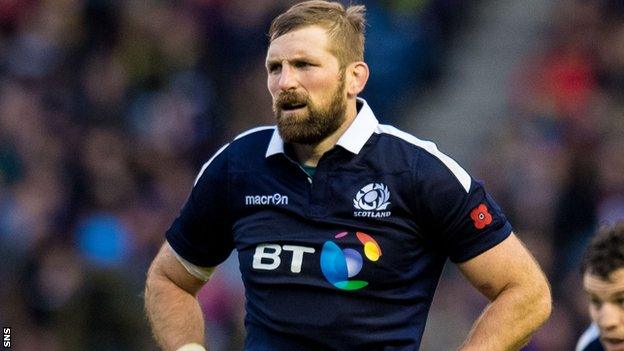
John Barclay is likely to earn his 56th Scotland cap against Ireland
He got himself back in the frame ahead of the last World Cup only to fall out of it again. Five back rows were taken and he wasn't one of them. A sixth was required mid-tournament. He didn't get the nod then either. Missing the tournament was the biggest shoeing he ever got.
Having missed so much does it mean more now? "When I was living in Scotland, I didn't take it [his Scotland place] for granted per se, but I felt like I was always in that bubble. Having had a couple of years of not being involved I feel like it's added to my career, mentally. I know it's not going to go on for ever, but you definitely want to make it last as long as you can."
Since the return there's been the high of the victory over France in last year's Six Nations and the low of letting victory slip against the Wallabies in the autumn. Barclay was immense that day.
The overall record doesn't make a pretty picture, though. In his Scotland years he has won 43% of his games. In the Six Nations it's five wins from 26. "I'm pretty embarrassed by that. It doesn't feel like that because we've toured well in the summer [a series win in Argentina, external and a victory against the Wallabies in Australia] or gone well over the autumn. It's disappointing.
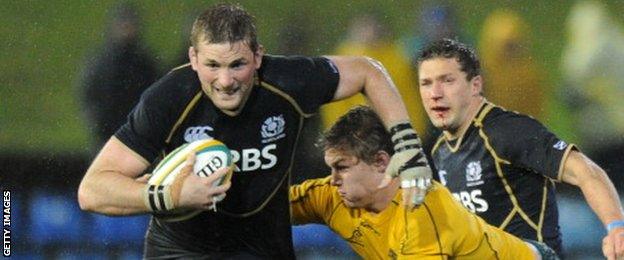
Barclay helped Scotland to a famous win over the Wallabies in Australia in 2012
"Part of the reason why it was really enjoyable to come back into the team is because I think we can really go somewhere and I'd love to be part of it. There's some genuine talent around, some guys who are playing out of their skin, some guys who have been hunted by big teams and that's not always been the case.
"There's some backs about it, isn't there? That back three [Stuart Hogg, Tommy Seymour and Sean Maitland] could mix it with anyone. There's a lot of options in the centre. Finn Russell has been tearing it up for Glasgow and Greig Laidlaw is steering the ship. There's a lot of promise. It doesn't necessarily mean it's going to happen, but it's exciting.
"Outside of our group do people 100% expect us to do well? I don't know. People say nice things. Vern doesn't really care about that. You don't get anything for that, do you?"
'My four-year old son is my Welsh translator'
It's hard to over-estimate what the Scarlets mean to Barclay. By the time his contract is up he'll have been there for five years. He might even stay a while longer. The club looked after him when he needed looking after. They invested in him. The supporters backed him to the hilt in his wilderness years in Scotland. He's settled and happy with his wife and their two young boys.
"There's a lot of good young players there and if they can keep hold of them they could be a very good team again. It feels like home. My eldest goes to Welsh pre-school. He loves it. Everything is in Welsh.
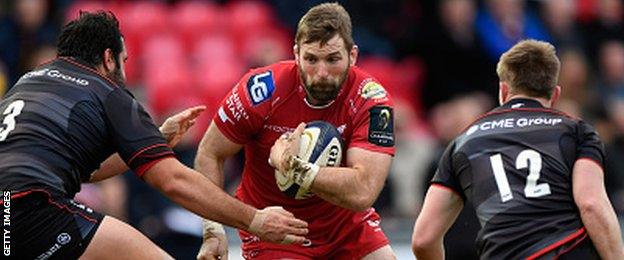
Barclay joined Scarlets in 2013 and says Llanelli "feels like home"
"He comes home and says something and I record it and I send it to [Scarlets centre] Scott Williams or [hooker] Ken Owens and they say, 'Oh, he said this...' I've no idea. Or I'll bring him into the club sometimes and Scott will say something to him in Welsh and he'll say something back. It's bizarre. It's really strange."
'Ireland bullied us'
Going into the Six Nations last year the lack of championship victories in the Scotland squad was stark to the point of being gobsmacking.
Russell, Mark Bennett and Jonny Gray had never won a Six Nations match and Seymour had won just one. Laidlaw and Barclay had won a meagre 15% of their championship matches, Hogg had won 16%, Ross Ford 18%, Alasdair Dickinson 20%. Richie Gray had the best percentage - 23% - with five wins from 22 Tests. Add in John Hardie and WP Nel, who hadn't yet played Six Nations rugby, and they were a side that were strangers to winning.
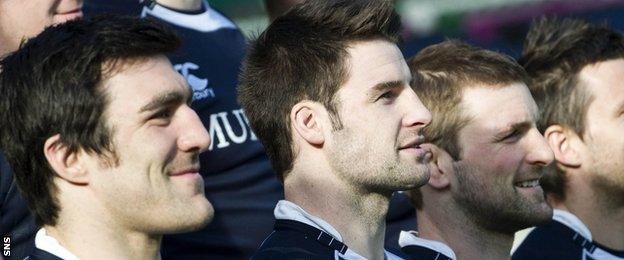
Barclay (right) formed an effective back-row combination with Johnnie Beattie (centre) and Kelly Brown (left). The trio were dubbed "The Killer Bs"
The numbers are a little better now by dint of the victories over France and Italy. There's also the benefits of bitter experience.
"We did a bit of analysis of it [the 35-25 loss to Ireland in Dublin last year]. We didn't front up. We weren't physical. We pretty much got steamrollered the first 30 minutes. You know what's coming and you've got to be physical.
"That's one of Vern's big things - he doesn't want soft rugby, he won't stand for it. I'd be very surprised and disappointed if we were bullied. The first 30 minutes of the game last year we probably were. Look at the collisions. It's not a nice word to say about yourself - you can put any word you want on it - but, physically, we got outmuscled in the first 30."
He is laid-back and softly spoken, intelligent and warm, but Barclay is constantly striving to be the warrior his team desperately needs him to be.
- Published1 February 2017
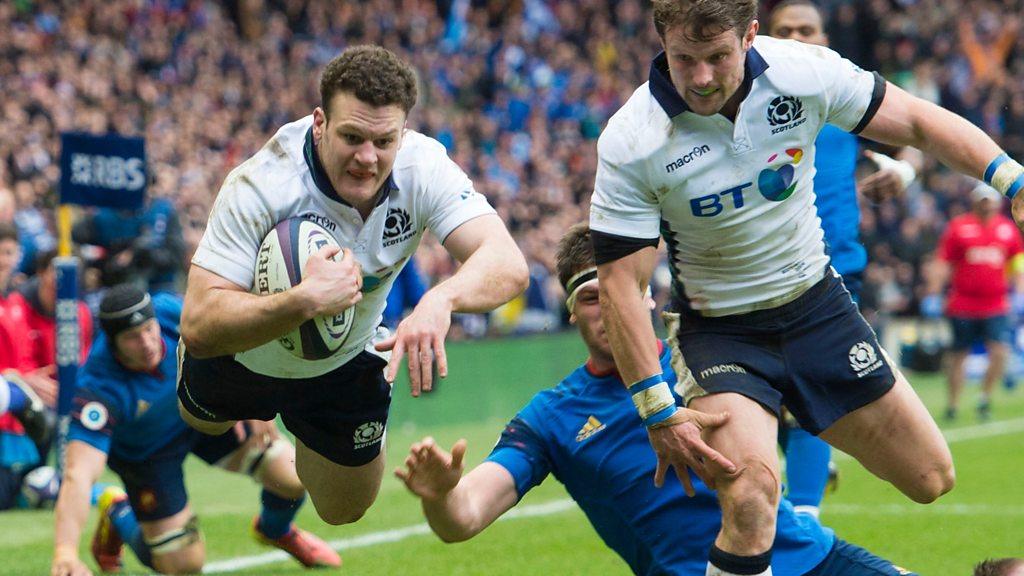
- Published1 February 2017
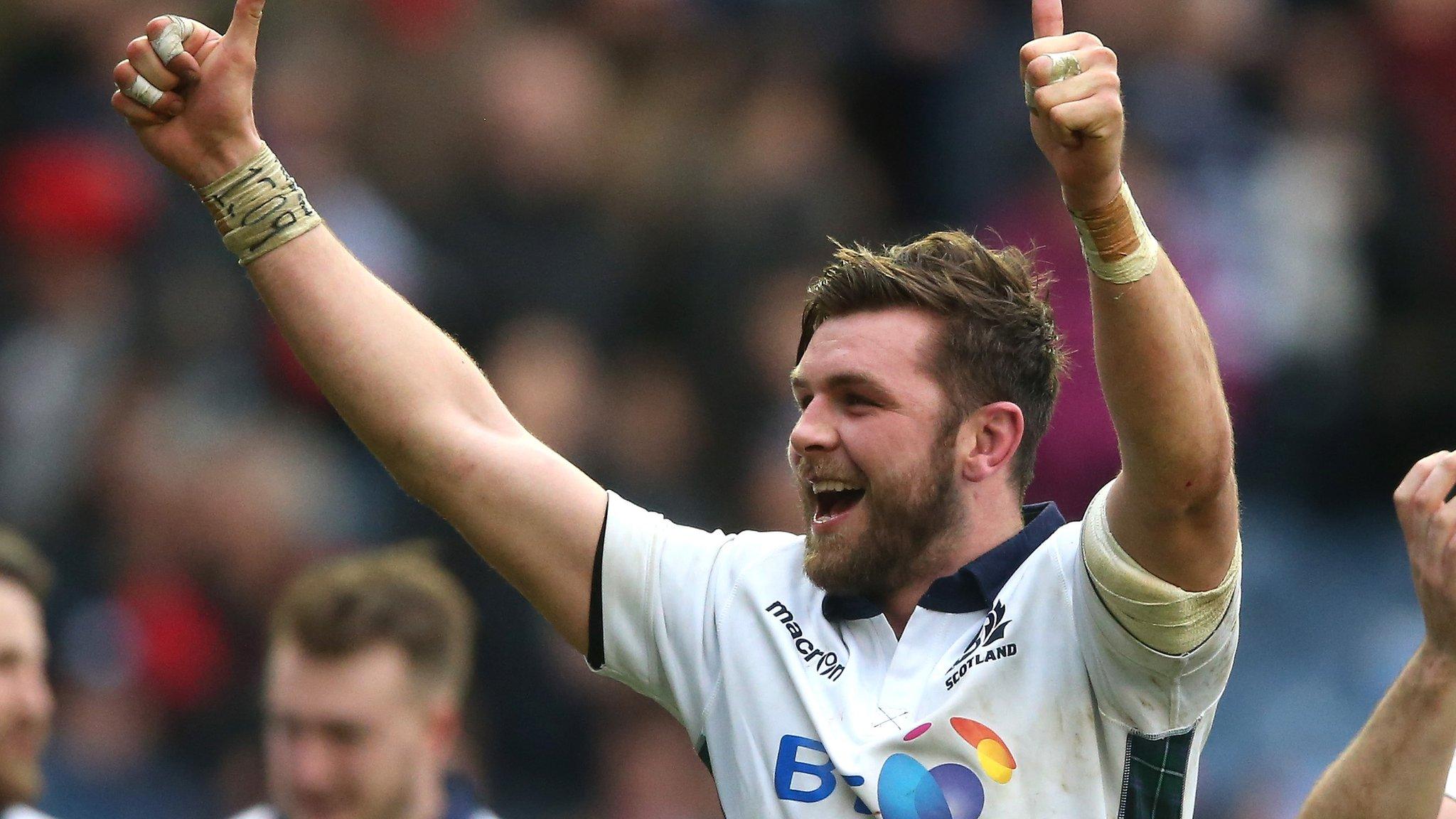
- Published31 January 2017
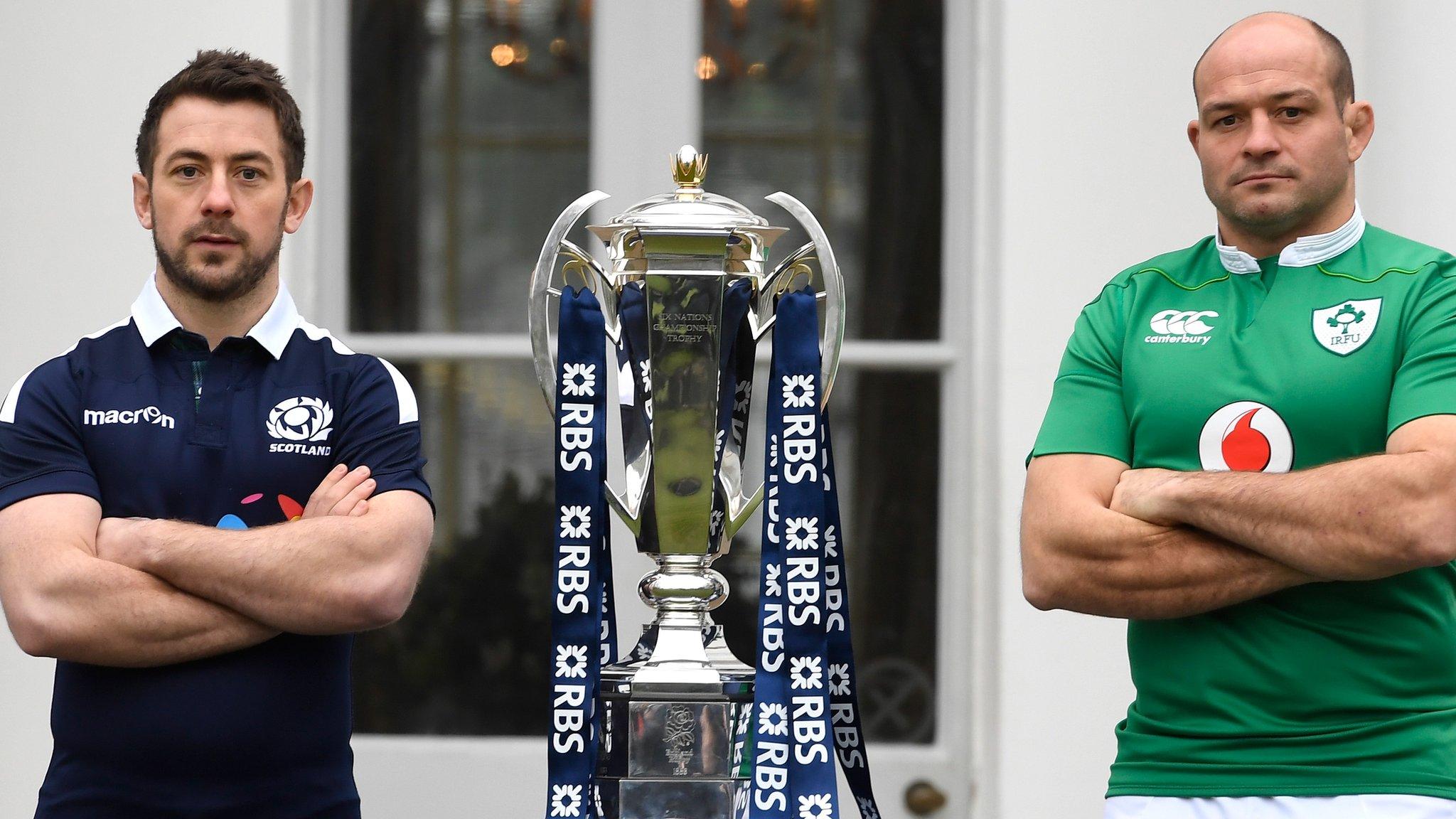
- Published30 January 2017